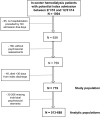Association of social worker-assessed psychosocial factors with 30-day hospital readmissions among hemodialysis patients
- PMID: 30558578
- PMCID: PMC6296214
- DOI: 10.1186/s12882-018-1162-4
Association of social worker-assessed psychosocial factors with 30-day hospital readmissions among hemodialysis patients
Abstract
Background: Evidence regarding the effect of psychosocial factors on hospital readmission in the setting of hemodialysis is limited. We examined whether social worker-assessed factors were associated with 30-day readmission among prevalent hemodialysis patients.
Methods: Data on 14 factors were extracted from the first available psychosocial assessment performed by social workers at three metropolitan Atlanta dialysis centers. Index admissions (first admission preceded by ≥30 days without a previous hospital discharge) were identified in the period 2/1/10-12/31/14, using linked national administrative hospitalization data. Readmission was defined as any admission within 30 days after index discharge. Associations of each of the psychosocial factors with readmission were assessed using multivariable logistic regression with adjustment for patient and index admission characteristics.
Results: Among 719 patients with index admissions, 22.1% were readmitted within 30 days. No psychosocial factors were statistically significantly associated with readmission risk. However, history of substance abuse vs. none was associated with a 29% higher risk of 30-day readmission [OR: 1.29, 95% CI: 0.75-2.23], whereas depression/anxiety was associated with 20% lower risk [OR: 0.80, 95% CI: 0.47-1.36]. Patients who were never married and those who were divorced, or widowed had 38 and 17% higher risk of 30-day readmission, respectively, than those who were married [OR: 1.38, 95% CI: 0.84-2.72; OR: 1.17, 95% CI: 0.73-1.90].
Conclusions: Results suggest that psychosocial issues may be associated with risk of 30-day readmission among dialysis patients. Despite the limitations of lack of generalizability and potential misclassification due to patient self-report of psychosocial factors to social workers, further study is warranted to determine whether addressing these factors through targeted interventions could potentially reduce readmissions among hemodialysis patients.
Keywords: Hemodialysis; Hospital readmissions; Mental health; Psychosocial factors; Social worker.
Conflict of interest statement
Ethics approval and consent to participate
Approval and oversight for this study was provided by the Emory Institutional Review Board (IRB00082448). Informed consent was waived for this secondary data analysis.
Consent for publication
Not applicable.
Competing interests
LP and BGJ serve on the Editorial Board of BMC Nephrology. The authors declare that they have no other competing interests.
Publisher’s Note
Springer Nature remains neutral with regard to jurisdictional claims in published maps and institutional affiliations.
References
-
- United States Renal Data System . USRDS 2018 Annual Data Report: Atlas of Chronic Kidney Disease and End-Stage Renal Disease in the United States. Bethesda: National Institutes of Health, National Institute of Diabetes and Digestive and Kidney Diseases; 2018.
-
- Centers for Medicare & Medicaid Services. End-stage renal disease prospective payment system, quality incentive program, and durable medical equipment, prosthetics, orthotics, and supplies: final rule. Fed Register. 2014;79(215):66119–265. - PubMed
-
- El-Majzoub S, Mucsi I, Li M, Moussaoui G, Lipman ML, Looper KJ, Novak M, Rej S. Psychosocial distress and health service utilization in patients undergoing hemodialysis: a prospective study. Psychosomatics. 2018; in press. https://www.ncbi.nlm.nih.gov/pubmed/30396686. - PubMed


